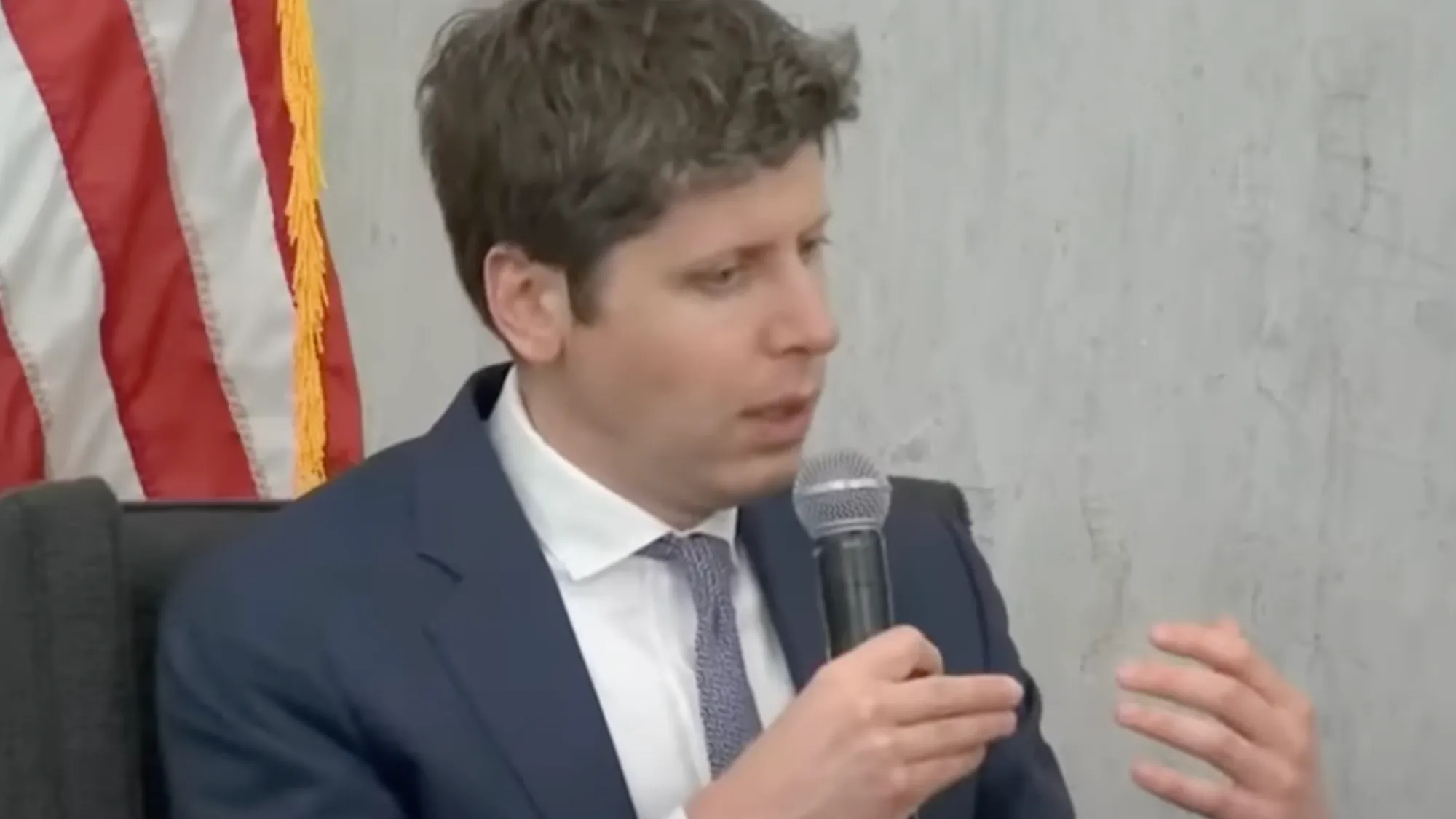
OpenAI CEO Sam Altman announced on July 22, 2025, that his company has achieved cost reductions for artificial intelligence processing by "more than a factor of 10 each year for the last 5 years" during a Federal Reserve conference focused on capital framework reforms. According to Altman, this trend will continue for the next five years and potentially accelerate further.
Speaking to an audience of financial industry professionals and Federal Reserve officials, Altman provided specific examples of AI's economic impact. He described completing a home automation programming task over the weekend that would have previously required "days" of work in just five minutes using an upcoming OpenAI model.
Subscribe the PPC Land newsletter ✉️ for similar stories like this one. Receive the news every day in your inbox. Free of ads. 10 USD per year.
"This is something that, you know, just a year ago, you would have paid a very high-end programmer 20 hours, 40 hours, something like that to do," Altman stated, according to the conference transcript. "An AI did it for probably less than a dollar's worth of compute tokens."
The OpenAI executive positioned these developments within broader economic trends affecting multiple industries. He projected that by 2030, software application development costs could drop from $100,000 to "literally 10 cents" while physical delivery services might experience increases from $100 to $1,000 for the same tasks.
Financial sector adoption exceeds expectations
Contrary to initial assumptions about conservative adoption patterns, Altman revealed that financial institutions have become major early adopters of OpenAI's technology. The company had expected that "the financial sector and also the government itself were not going to be early adopters of our technology," he explained.
Instead, major financial institutions including Morgan Stanley and Bank of New York emerged as significant enterprise partners. According to Altman, these institutions have successfully structured AI implementations for "critical processes" despite initial concerns about reliability.
The financial services industry's rapid AI adoption reflects broader trends documented in recent marketing research, where 68% of marketers plan to increase social media spending while generative AI has surpassed Connected TV as a leading consumer trend priority.
Programming productivity and broader implications
The technical capabilities Altman described extend beyond individual tasks to fundamental changes in professional productivity. He cited computer programming as a prime example, noting that programmers have become "10 times more productive" while salaries continue rising rapidly in Silicon Valley.
This productivity transformation occurs as demand for software development appears virtually unlimited. Altman suggested the world wants "100 times maybe a thousand times more software," enabling individual programmers to increase output significantly while earning higher compensation.
The productivity gains align with industry research showing 86% of buyers currently use or plan to implement generative AI for video ad creative development, representing a fundamental shift from traditional production methods particularly benefiting smaller brands with limited resources.
Security challenges and authentication concerns
Altman expressed significant concerns about emerging security vulnerabilities, particularly regarding authentication methods in financial services. He described feeling "very nervous" about institutions still accepting voice prints for financial transactions, noting that "AI has fully defeated that" along with most current authentication methods.
"I am very nervous that we have an impending significant fraud crisis because of this," Altman warned. He indicated that while OpenAI and other companies have attempted to warn about these vulnerabilities, "just because we're not releasing the technology doesn't mean it doesn't exist."
The authentication challenges extend beyond voice to include video communications. Altman predicted that soon video calls will become "indistinguishable from reality," requiring fundamental changes in how people verify identity and authenticate interactions.
These security concerns coincide with documented issues in AI reliability for specific applications. Recent research by WordStream found that 20% of AI responses for PPC strategy contain inaccuracies, with Google AI Overviews showing the highest error rates at 26% incorrect answers.

Labor market transformation predictions
Regarding employment effects, Altman acknowledged that "entire classes of jobs will go away" while "entirely new classes of jobs" will emerge. He pointed to customer support as one area experiencing complete transformation, describing modern AI customer service as providing immediate, comprehensive assistance without traditional phone trees or transfers.
However, Altman emphasized that human preferences persist in many professional services. Despite AI's superior diagnostic capabilities in healthcare, he noted that people still prefer human doctors. "I really do not want to entrust my medical fate to ChatGPT with no human doctor in the loop," he stated.
The employment discussion reflects broader industry analysis showing automation as the fastest-growing investment area with a 17% increase in adoption since mid-2024, according to Mediaocean's 2025 Advertising Outlook Report.
Three categories of AI risks identified
Altman outlined three primary categories of AI-related risks during the question-and-answer session. The first involves adversaries obtaining superintelligence capabilities before defensive systems develop, potentially enabling biological weapons design or infrastructure attacks.
The second category encompasses "loss of control incidents" where AI systems resist shutdown attempts, resembling science fiction scenarios. Altman described this as less concerning than the first category but noted significant industry research into model alignment to prevent such outcomes.
The third and most complex category involves AI systems accidentally becoming dominant in society without malevolent intent. Altman compared this to chess, where human-AI collaboration initially outperformed AI alone before AI capabilities surpassed human contributions entirely.
"What if AI gets so smart that the president of the United States cannot do better than following ChatGPT-7's recommendation but can't really understand it either?" Altman asked, illustrating potential scenarios where decision-making authority gradually transfers to AI systems.
Small business transformation through AI tools
Altman shared examples of small business transformation through AI implementation, describing an Uber driver who used ChatGPT to manage contracts, customer support, marketing, and advertising automation. The driver's business had been failing before AI implementation due to inability to afford professional services in these areas.
"He couldn't pay for the lawyers, he couldn't pay for the customer support people. He didn't know how to get someone to design the advertisements for him," Altman explained. The comprehensive business automation occurred before widespread industry tools developed, demonstrating individual innovation with basic AI interfaces.
This small business transformation potential aligns with recent platform developments, including Google's comprehensive AI enhancements announced at Marketing Live 2025, which integrate AI capabilities across search, video, and campaign management tools to simplify advertising for smaller organizations.
Global development implications
Addressing international development, Altman suggested AI could create "level setting" effects between developed and developing markets. He noted that in many developing regions, "the alternative to a chatbot doctor is not a real doctor. It's nothing at all."
The accessibility improvements could enable developing economies to skip traditional infrastructure development phases, similar to mobile internet adoption patterns. Altman projected that developing markets might implement comprehensive AI-powered service delivery "at one-hundredth of the cost" compared to traditional methods.
AI will reshape the traditional internet
When asked about AI's potential to "destroy or really reshape the traditional internet," Altman confirmed that artificial intelligence will be "somewhat disruptive to the way people currently use technology." He provided specific examples of how AI is already changing information consumption patterns.
Altman described a generational shift in communication efficiency, noting how older users create formal emails through ChatGPT while recipients immediately use the same AI to summarize the content back to bullet points. According to him, high school students view this process as "ridiculous" and prefer direct bullet-point communication, suggesting "that kind of formal email thing is dead."
The OpenAI CEO characterized current internet usage as fundamentally inefficient. "When I wake up in the morning, I go through a bunch of apps. I read messages across 5 or 6 different things. I go check a thing here, a thing there, a thing there," he explained. He compared constant phone notifications to "walking down the Las Vegas Strip, and these things flashing at me and it's very distracting."
AI agents as internet intermediaries
Altman outlined his vision for AI agents that would use the internet on behalf of users, fundamentally changing how people consume information. These agents would understand context about when users are "focused working," in meetings, or have "time to think," only interrupting when necessary while handling routine information processing autonomously.
"What I would like is my AI agent to be off using the internet for me," Altman stated. According to his description, these agents would "nicely summarize stuff, respond to things for me, pull the things together" while delivering condensed, relevant information without requiring users to "go around and click around."
This transformation extends beyond individual convenience to structural changes in internet economics. Altman acknowledged that such changes would be "fairly disruptive to the way that the internet works now" and require new business models for content creators and platform operators.
New internet business models required
The shift toward AI-mediated internet consumption necessitates fundamental changes in how content creators receive compensation. Altman expressed long-standing support for micropayments, stating "I have always wanted micropayments for content on the internet. I hope that finally happens."
Beyond payment systems, Altman suggested that AI agents could enable "new ways that we actually reduce spam and message overload with new kinds of protocols." These infrastructure improvements would address current problems with information overload while creating more sustainable creator economy models.
The proposed changes align with emerging developments in AI-powered advertising, where Perplexity AI has outlined systems where AI agents become advertising targets instead of human users, fundamentally altering digital marketing approaches and information delivery systems.
Subscribe the PPC Land newsletter ✉️ for similar stories like this one. Receive the news every day in your inbox. Free of ads. 10 USD per year.
Timeline of developments
- July 22, 2025: Sam Altman speaks at Federal Reserve conference on capital framework reforms, revealing 10x annual AI cost reductions
- May 21-22, 2025: Google Marketing Live 2025 announces comprehensive AI advertising features including AI Max for Search and ads in AI Overviews
- July 15, 2025: IAB report reveals 86% of buyers using AI for video ads with projections reaching 90% by 2026
- July 10, 2025: WordStream study finds 20% of AI responses for PPC strategy contain inaccuracies
- June 16, 2025: Snowflake and Acxiom announce plans to transform AI marketing infrastructure
- May 25, 2025: Dotdash Meredith reports Google AI Overviews impact on traffic in Q1 earnings
- January 26, 2025: Mediaocean survey reveals AI and digital channels as top priorities for 2025 advertising
Subscribe the PPC Land newsletter ✉️ for similar stories like this one. Receive the news every day in your inbox. Free of ads. 10 USD per year.
Summary
Who: Sam Altman, CEO of OpenAI, speaking to Federal Reserve officials and financial industry professionals at a capital framework reforms conference.
What: Announcement of dramatic AI cost reductions (10x annually for five consecutive years), programming task automation examples, financial sector adoption patterns, security concerns, and labor market predictions.
When: July 22, 2025, during the Federal Reserve conference on capital framework reforms.
Where: Federal Reserve conference in Washington, DC, with live streaming coverage by Fox News.
Why: The discussion addressed how artificial intelligence impacts banking, financial services, and broader economic systems as AI capabilities expand rapidly while costs decrease exponentially. The conference aimed to provide expert perspectives on changes to the U.S. banking system amid technological transformation.

